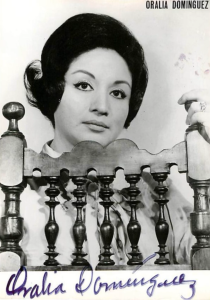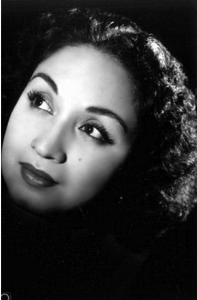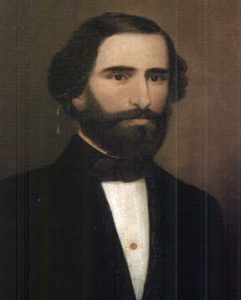Podcast: Play in new window | Download (Duration: 1:26:52 — 85.9MB) | Embed
Subscribe: Spotify | TuneIn | RSS | More
Today (for what I hope are obvious reasons) begins a short Countermelody series on a few of the greatest singers that Mexico, our neighbor to the south, has gifted to the world. Contralto Oralia Domínguez (25 October 1925 – 25 November 2013) is famed for her collaborations with such musical giants as Maria Callas and Herbert von Karajan, but on her own terms, she ranks alongside those monumental true contraltos like Marian Anderson and Kathleen Ferrier. Though there is no question that she was under-recorded, she left a handful of classic commercial recordings, and a plethora of recorded live performances which an artist both technically grounded and fearless in expression, one whose legato singing exuded repose just as her phenomenal coloratura singing generates genuine excitement. I cannot say enough about this artist, who has rapidly become one of my very favorites! This episode, an expansion of a bonus episode I published a few years ago, features Domínguez in extended operatic scenes by Cilea, Saint-Saëns, and Monteverdi and in religious works by Verdi and Lili Boulanger as well as Spanish and Mexican songs, capped with some stunning vocalism in baroque works by Handel and Vivaldi. Vocal guest stars include the late great Antonietta Stella, Jon Vickers, Barry McDaniel, Luigi Ottolini, and the blazing hot verismo soprano Clara Petrella; conductors include Jean Fournet, Igor Markevitch, Alberto Zedda, Oliviero de Fabritiis, Herbert von Karajan, Fernando Previtali, Nicola Rescigno, Renato Cellini, and Leonard Bernstein. In other words, the “big guns,” an indication of the enormity of the magisterial talent of Oralia Domínguez.
Countermelody is a podcast devoted to the glory and the power of the human voice raised in song. Singer and vocal aficionado Daniel Gundlach explores great singers of the past and present focusing in particular on those who are less well-remembered today than they should be. Daniel’s lifetime in music as a professional countertenor, pianist, vocal coach, voice teacher, and journalist yields an exciting array of anecdotes, impressions, and “inside stories.” At Countermelody’s core is the celebration of great singers of all stripes, their instruments, and the connection they make to the words they sing. By clicking on the following link (https://linktr.ee/CountermelodyPodcast) you can find the dedicated Countermelody website which contains additional content including artist photos and episode setlists. The link will also take you to Countermelody’s Patreon page, where you can pledge your monthly support at whatever level you can afford.



